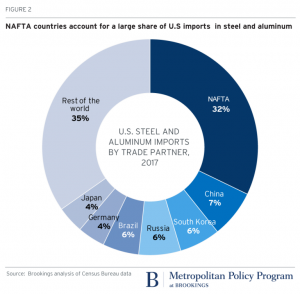Does/Should the President incorporate the Public’s Opinion into Policy Making?
Does/Should the President incorporate the Public’s Opinion into Policy Making?
The President’s relationship with the American people and role in policy making has transformed the most of out all the three legislative branches in government. Chapter 12 compared the original president’s position more as an international figure with influence on foreign relations and less authority in domestic policy making. The founding fathers of the United States believed the president should not be overly concerned or influenced by the unjustified opinions of the mass public. Today, the president’s role has democratized by requiring focus on the wants, needs, and opinions of the general public in order to maintain a positive approval rating. However, the president’s weight on the general public’s opinions into national policy making is highly variable.
President Trump has recently announced the newly mandated tariffs applied to aluminum, steel, and many other imported goods from countries such as China, Canada, and the European Union. For example, his policy imposes tariffs of 25 percent on steel and 10 percent on aluminum. In response, China’s ambassadors to the United States have disclosed their plans to target many exported American goods by increasing their importing rates. Some of the products China plans to increase rates on include soy beans, pork, wine, blue jeans, and motorcycles. Even though these adjustments to foreign trading are at large, the outcomes do affect the local economies of the United States.
Local midwest farmers have warned President Trump that China’s increased tariffs on their crops will crush their business and make it difficult to profitably operate. Trump’s tariffs on imported aluminum and steel along with the response of China’s tariffs on agricultural products have triggered the American peoples’ thoughts.
Above is a diagram created by the Metropolitan Policy Program that demonstrates the portion of each global regions’ share of United States imports of steel and aluminum. Many local American companies, such as oil drillers and petrochemical producers rely on imported steel and aluminum to support their operations. The Metropolitan Policy Program recorded that the port of New Orleans imported 2.48 million tons of steel in 2017, which accounts for 30 percent of its tonnage. The level of steel imports in Missouri, Louisiana, Connecticut, and Maryland account for at least 5 percent of total state imports, double the share of the nation’s 2 percent total.
After this information was released by several media agencies, Trump acknowledged the public’s opinion but allowed it to have little to no influence on this policy making. CNN released a report on April 9, 2018 that President Trump’s response to the affects local farmers was the following, “Farmers are great patriots. They understand that they’re doing this for the country. And we’ll make it up to them. And, in the end, they’re going to be much stronger than they are right now.” Therefore, the President decided to uphold his new tariff policy after he disregarded the farmer’s opinions. As one can see by watching the daily news and current events, the president’s choice to incorporate the public’s opinion into policy making is never consistent even though the president cannot succeed without strong public support.
http://money.cnn.com/2018/04/09/news/economy/trump-farmers-china-tariffs/index.html
https://www.brookings.edu/blog/the-avenue/2018/03/06/how-trumps-steel-and-aluminum-tariffs-could-affect-state-economies
